VATICAN CITY -- “That there is the Casa di Santa Marta, where Pope Francis lives. That down there is the monastery where Pope Ratzinger retired. And this right here is the Terrace of Scandals.”
I am strolling on the roof of the Palazzo San Carlo with the man who for eight years was the most powerful person in the Vatican after the pope: Cardinal Tarcisio Bertone, the Vatican's former secretary of state. For decades, he's been one of the church's most powerful officials -- and he's been suspected of playing a central role in some of the Curia’s most mysterious intrigues, including last year's allegations that he mishandled millions of dollars through the Vatican Bank.
Sunlight gleams off the towering cupola of St. Peter’s, that Roman sunlight which already portends the arrival of spring. This terrace has for months been presumed to be part of Bertone’s lavish -- and widely criticized -- retirement complex: a 2500-square-foot luxury apartment with a view of the city. But the terrace is shared, and the supposed extravagance of the balcony can in fact be enjoyed by everybody in the building, without giving direct access to Bertone’s apartment. He gives a sly smile.
“A certain cardinal told me this would be a magnificent place to relax and meditate. But it was not up to me to decide," he says. "Despite what has been written and said, it does not belong to me; it is for the use of all the building’s residents.”
Bertone lives here in an apartment on the third floor that for decades was the home of Camillo Cibin, the legendary head of security for John Paul II. The condominium resembles many others in the Vatican area. At first glance, Bertone’s home is not more than 1000 square feet, comprising two small secretarial rooms for his secretary, a living room, a long corridor, a private chapel, a bedroom, a kitchen, a bathroom and a small terrace filled with grapes, olives and jasmine. The room that serves as library and study is a whole other story. There is a glass cabinet where the cardinal keeps his treasured Fiats: little red models of the Ferrari Formula One, black-and-white scarves and Juventus soccer balls autographed by the players.
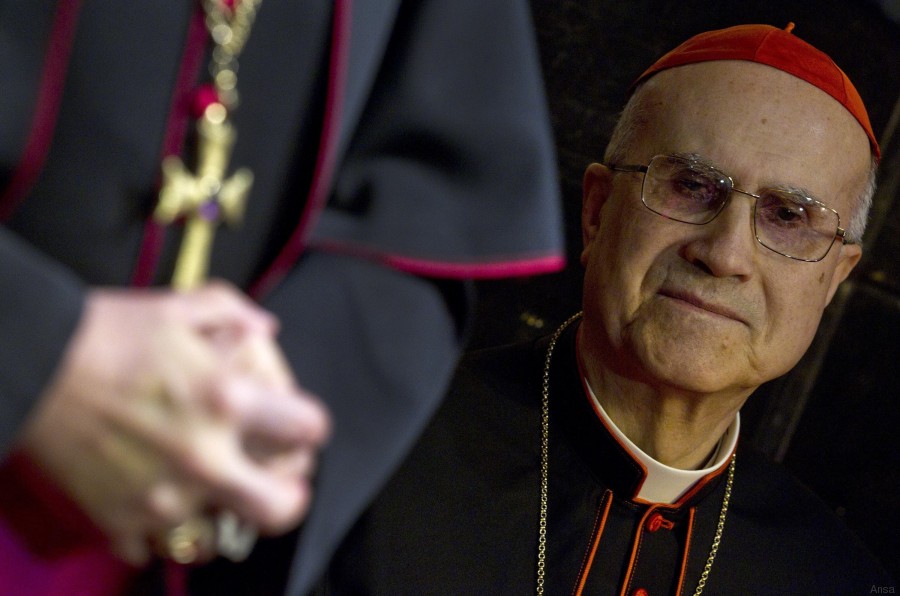
For years, Bertone chose to be silent in the face of all the accusations that came down on him. But now, 80 years old and no longer at the top of the Vatican hierarchy, he has decided to get a few things off of his chest -- first, by showing his home, where those little models are perhaps the most valuable furnishings. As for the secrets and machinations that he has been accused of, he is “collecting material” for an upcoming writing project. The biggest of the accusations he will address by writing in his own hand the truth about the long, tormented era when he governed the church under three different popes, two of whom are now his neighbors.
Your Eminence, why is everybody out to get you?
Well... they say there are two motives. The first is because I was nominated as secretary of state without going through the Vatican’s channels of diplomacy.
An exception to tradition.
You could say that. Since the transition is so venerated, it was not well received.
The second reason?
It concerns the job I performed. During the eight years I served as secretary of state, I executed my duties in perfect compliance with the pope, but [I] took actions, began procedures, reformed offices and made appointments that involved the advancement or exclusion of some people. And this might have made certain of them dissatisfied. But there was also a certain outrage...
Why outrage?
Well, it is undeniable that some of the problems we had to face were dramatic, the pedophile question for instance. I also worked to launch procedures for economic transparency and anti-laundering legislation. In the beginning, Benedict’s papacy looked promising; but successive developments, including certain moments of tension, were intentionally provoked against the church. Perhaps, in some way, so were the attacks against me.
They wanted to harm the pope?
Somebody thought about it and somebody also wrote about it.
Ratzinger’s papacy was extremely different from that of his predecessor.
Of course. But it developed in relation to that of his predecessor. Pope John Paul II thought very highly of Cardinal Ratzinger and led the church with his permanent and continual support, not just on a doctrinal and intellectual level but also, regarding certain aspects, in accordance with his vision of administration. There was, therefore, continuity between the two popes.
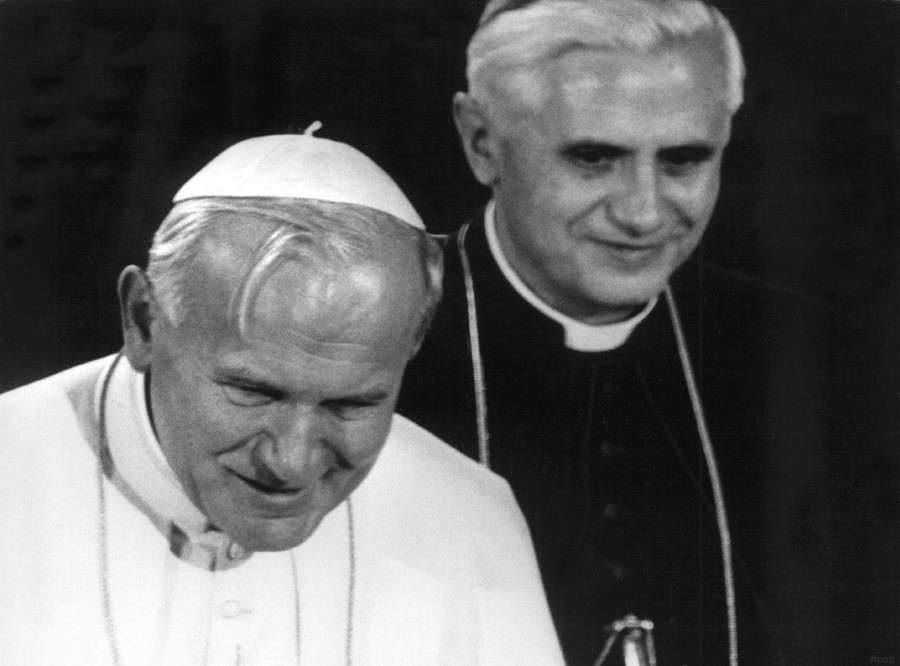
With a difference in communication abilities...
Yes, but also a difference in character. But we must appreciate that Pope Benedict, in his turn, led the church as a priest enlightened not only spiritually, but technologically. First as prefect of the Congregation for the Doctrine of the Faith, and then as pope, he met thousands of bishops, listened to them one by one and kept abreast of local situations until he built up a global vision that allowed him to create guidelines and govern the church universally.
At a certain point [though], he felt the burden of not being able to continue this method of direct, concrete knowledge -- that is, physical contact with local communities as Pope John Paul II had done before him and as Pope Francis is doing now. It was a thought that troubled him until he realized that there was need of a pope with sufficient energy to travel and continue these meetings all over the place in person.
In other words, Pope Benedict’s was a sort of unfinished papacy.
On the contrary. It was a courageous papacy. Before every trip journalists would write that he wouldn’t be able do it. They would predict insufficient, substandard results and flops. But I think about the trips to Turkey and England that I made with him, to World Youth Day in his native Cologne when he led more than a million youths in silent prayer before the Body of Christ.
How surprised were you by his decision to leave?
I had guessed it, but put it out my thoughts. I knew long in advance, at least seven months before. And I had many doubts. We debated the topic at length after it seemed already decided. I told him: Holy Father, you must bestow upon us the third volume on Jesus of Nazareth and the encyclopedia of faith, before you sign things over to Pope Francis.
It was Christmas 2012.
Yes. And I will tell you that it was not at all easy to keep this secret. The pope meditated and reflected deeply with God about this choice.
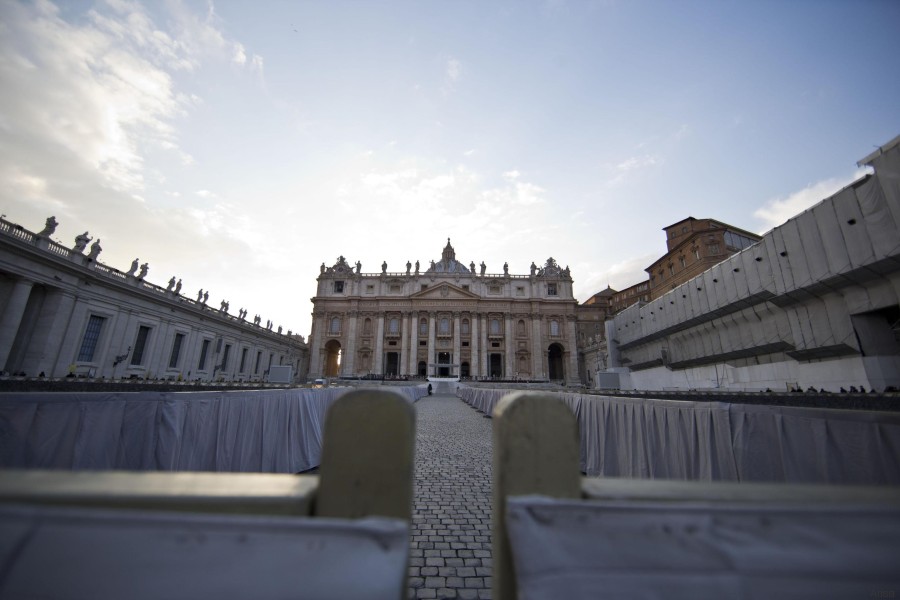
It is difficult to make a pope change his mind, particularly a German one...
When they make certain decisions before God, how can we humans presume to interfere?
How is your relationship with Pope Francis?
Extremely positive, very wonderful. He kept me on as secretary of state for seven months filled with audiences and tickets, notes, telephone calls... By now everybody knows he has a habit of picking up the phone and calling: I need this, look for this, see if this candidate is qualified. It was a constant and warm consultation.
Up until your departure.
We met, spoke and decided what to do. Although the journalists write, "Bertone was thrown out of here, thrown out of there..."
When he referenced “transfers” as one of the problems in the Curia, was he referring to you?
I don’t know. But when this apartment was first criticized, he called me up and said, “Look, I do not have anything against you going to live on the third floor of Palazzo San Carlo.” It needs to be said that there was a pre-existing project here in the building to build a terrace, which was not my idea.
So it was the pope who gave you these quarters.
Of course. And in the conversation we had, he also said to me, “We will not build anything else, but let’s adjust the pavement of the terrace because the rain is coming inside.” And, irony of ironies, the rain still comes inside, right into my bedroom. [Smiles] As if I would have planned that myself.
So it’s not a 25,000-foot penthouse.
Not at all, you’ve seen so yourself. I guarantee that the rooms are much smaller than those in some of the Vatican’s other buildings. The pope was informed about everything, even the small secretary’s office. He said to me, “It’s perfectly fine and you are entitled to it, seeing as you need to write your memoirs, given you have been witness to three papacies...”
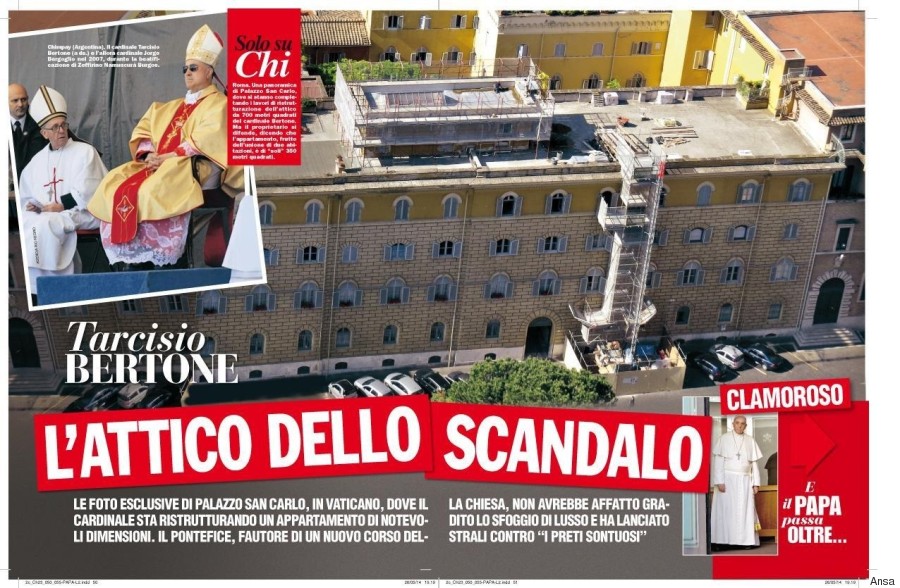
And are you writing?
I am collecting material.
Do you continue to hear from the pope?
Anytime that I want. When I turned 80 in December 2014, we met and talked, among other things, about my logical successor as Camerlengo [papal chamberlain]. Of course, Cardinal [Jean-Louis] Tauran was then nominated, a good friend of mine whom I worked with in several departments, including the Supervisory Commission of Cardinals of IOR [the Institute for the Works of Religion, sometimes called the Vatican Bank]. But he appointed me as a member of the Congregation for the Evangelization of Peoples, which is responsible for all of the missions of the world, for two years. So I would not say that they just “threw me out.”
Speaking of, you went to Cuba on the eve of the resumption of the country’s relations with the United States. For a mission, or as a missionary?
I went at the invitation of several bishops but also... with a small task delegated by the Holy Father.
To complete diplomatic work which encouraged the historic thawing between the Castro regime and Washington?
I made five trips to Cuba and made my contribution to Cuba-U.S. relations. But I will not say anything else.
But you’re smiling. You’re giving yourself away.
Well, it is not something that just fell from heaven. There was a lot of work behind it, including the intervention of Pope Francis, who personally wrote to the protagonists of the events, who then made the official announcement.
Are you worried about the threats coming in from the Middle East?
Listen, this is not the first time the church has been threatened. Or even the pope. Just recall the attacks on Paolo VI in Manila and on John Paul II here in St. Peter’s Square. Of course, now these threats are more imminent, as well as more unpredictable in terms of whether they will be carried out.
What countermeasures have you taken?
We have increased security, as well as the collaboration between the different security units, which is a fundamental precaution. But at the same time the Holy See has made great efforts in the areas of dialogue and interreligious, intercultural and interethnic understanding. I’m talking about initiatives such as the meeting between the Israeli President [Shimon] Peres and the Palestinian President Abu Mazen promised by Pope Francis, which was also attended by the Ecumenical Patriarch Bartholomew I of Constantinople. This dialogue, with the most balanced and rational components of various religions, is the first form of precaution against threats that come from fanatics like [the Islamic State].
Pope Francis’s position on the excesses of satire against religion after the attacks in Paris was surprising.
Pope Francis rightly reaffirmed the necessity of a limit which will not offend religious sentiments, which are the most deeply felt sentiments in every individual.
Even at the cost of sacrificing freedom of expression?
This is a fundamental right, unquestionable in free and democratic societies. I am talking about a code of conduct. But also of strongly condemning violence, above all violence ascribed to religion.
Do you fear for the pope’s safety?
I am afraid, but also confident in the precautions we have taken. Besides, the pope has said that the Vatican is watched over by the Archangel Michael, and since angels and archangels are recognized by many religions, including Islam, there cannot be greater protection than that.
Does the pope feel restricted by these security measures?
A bit, yes. He is a pope who requires freedom of expression and movement.
And he seems to want to open the door to crucial issues concerning the relationship between the church and modern society, from divorce to homosexuality.
This pope has the profound training of the Jesuits, but has also absorbed the teachings of the Salesians. As an educator of young generations and the bishop of a big city like Buenos Aires, he has always been a man of great benevolence open to all the realities of life.
So he is a pope who is unifying doctrine and practice?
Yes, but I do not think he will compromise on doctrine, even if I express my opinion. Pope Francis will certainly open up new areas of acceptance and conversation. It should be remembered that the question of including homosexuals in the church was already present in Cardinal Ratzinger’s document of the Congregation for the Doctrine of the Faith, which Pope Francis is now taking up and developing with a greater impact on the media. Regarding divorcees, there was also already an invitation for support from the parishes both in the teachings and practices of the diocese, which some did not acknowledge.
Ultimately, yes: There is progress and there is emphasis on reflecting on and in-depth analysis of these questions, and we will see where that leads.
Regarding pedophilia in the church, Pope Francis has taken a very determined position.
And he is clarifying its positions and actions.
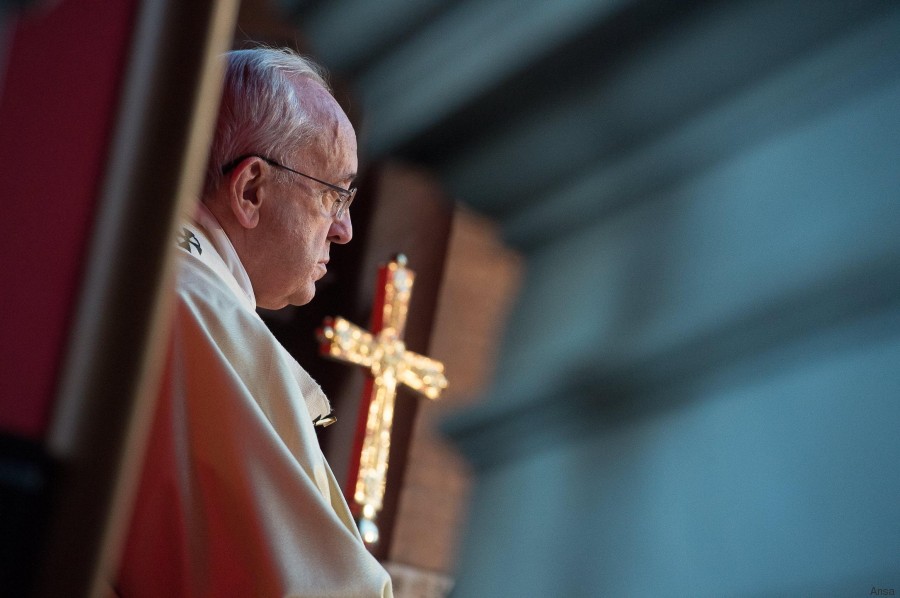
Also on the request for transparency.
Of course. But I do not see any great advances between the two popes. Pope Ratzinger also signed very clear regulatory actions which were recognized on an international level.
Your Eminence, one of the harshest criticisms that has been made about you concerns your role as the puppeteer managing IOR, the Vatican Bank.
That was absolutely not the case and we have ways of clarifying everything.
With the book you are writing?
That will certainly be a part of it. I was president of the committee that oversaw the bank and I acted in accord with the cardinals. It has been said that they were often against my decisions, but this is not true either. We were complied with and were respectful of the statute. As for me, it was also my job to listen to the president and the Superintendent Council and the meeting notes all confirm this. I was not the puppeteer or despot of the bank. And every decision was always make in accordance with the Holy Father. On the other hand, IOR's structure has always worked...
Not always very well.
I’m not talking about past problems, but those from the last few years. I can honestly say I have not consciously abused my power. I always worked within the norms of the statute and made decisions in accordance with the Commission, and, above all, the Holy Father.
Even regarding the removal of Gotti Tedeschi as president of the Vatican bank?
Yes, absolutely. Even for that change.
How is living in the Vatican with two popes?
Wonderful. I see Pope Benedict every so often, we speak on the phone, he invites me to lunch. I pray for him and he is constantly asking about my life and initiatives, mainly the cultural and religious ones. I have occasion to see Pope Francis during audiences and ceremonies, and also informally. Furthermore, praying for the current successor of St. Peter is a daily duty that goes along with his ministry and tireless evangelization efforts for peace in the world.
One last inquiry, your Eminence. What’s the real story behind that birthday dinner of DOC wine and Alba truffles?
[Editor's note: Bertone reportedly celebrated his 80th birthday in December with a luxurious and pricey dinner, which some in the Italian press criticized as going against Pope Francis' example of living a simple life.]
[Laughs] I’ll only tell you that it was a dinner organized by the Associazione degli alpini di Vercelli, my old diocese, without DOC wine and without truffles, but with an excellent tartufata: a kind of pastry with a sprinkling of chocolate on top. To me it does not seem an excessive luxury for celebrating an 80th birthday, or don’t you think so?

CORRECTION: A previous version of this article mistranslated the Catholic order of the Salesians as the "Silesians," a historical region of Poland. In addition, at several points "Santo Padre," or "Holy Father," was mistranslated as "St. Peter." We regret the errors.
This post originally appeared on HuffPost Italy and has been translated into English and edited for an American audience.
